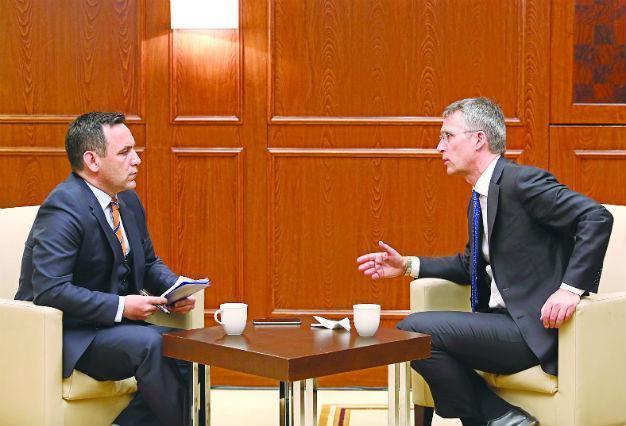NATO chief warns about complacency on migrants
Deniz Zeyrek - ANKARA

HÜRRİYET photo
There has been a dramatic reduction in the number of migrants and refugees illegally crossing the Aegean Sea from Turkey into Europe, but authorities must not let down their guard as people smugglers can rapidly change routes, the head of NATO has cautioned.The migrant crisis has shown the urgent need for a peaceful solution in Syria and the country’s fragile cease-fire remains the best way forward, NATO Secretary-General Jens Stoltenberg said April 21 in Ankara on the last day of a two-day visit to the Turkish capital for talks with President Recep Tayyip Erdoğan, Prime Minister Ahmet Davutoğlu, Foreign Minister Mevlüt Çavuşoğlu and Defense Minister İsmet Yılmaz.
“Based on information NATO has provided, Turkey is taking action to break the business model of human traffickers. And figures from different international organizations confirm that the numbers of migrants and refugees crossing the Aegean Sea are now going significantly down,” Stoltenberg said at a joint press conference with Turkey’s foreign minister while wrapping up his visit.
“It confirms that our collective efforts are making a difference. We need to remain flexible because the people smugglers can shift their routes very rapidly,” he said, sounding a note of warning.
Greece has been returning migrants from Lesbos to Turkey under a landmark European Union deal signed March 18 to stop the uncontrollable influx of refugees into Europe.
NATO ships have been patrolling the Aegean Sea, conducting reconnaissance, monitoring and surveillance activities as directed, while the alliance has been sharing information with Turkish and Greek authorities and the European Union’s border agency, FRONTEX, to assist in the international efforts to counter human trafficking and criminal networks in the region.
‘NATO not prejudicing national positions in the Aegean’
“We recognize the progress that has been made, the significant reduction in the number of illegal crossings. Of course, that is not only caused by the NATO presence; it is part of a broader collective effort. We are aware of the sensitivities in these waters for both Turkey and Greece. But we have made very clear that the NATO presence in the Aegean Sea shall in no way prejudice any national positions on the issues in the Aegean Sea.
So we are able to be there without prejudicing any of the sensitive issues which we are all aware of in relations between Turkey and Greece in this area,” Stoltenberg said in an exclusive interview with Hürriyet, referring to the lack of bilateral conformity between Athens and Ankara regarding the boundaries of their territorial waters and airspace in the Aegean due to the peculiar geography of the Aegean Sea, where some Greek islands abut Turkey’s western coasts.
“NATO ships have been concentrating their presence in the area where we have seen the highest number of crossings, especially around Lesbos where, without comparison, most of the illegal crossings have taken place, and Chios. And we have seen, as I said, a dramatic reduction. … We monitor, we conduct surveillance on the area, and then we share that information in real time with the Turkish coastguard, the Greek coastguard, the EU border agency, and we have seen that, for instance, the Turkish coastguard and the Turkish navy have taken action upon the information they receive from NATO. So in that way, we contribute to managing the situation in the Aegean Sea. The aim is to cut the lines of illegal migration of the criminal networks and then to be able to take refugees in a legal and orderly and in a safe way from Turkey to Europe.
This is part of the agreement with the European Union. So our aim is to be part of the efforts to stop the dangerous, illegal and disorderly flow of people from Turkey to Europe and then facilitate … a legal and safe movement of people,” Stoltenberg said.
Applause for Saudi Arabian initiative
“I welcome all efforts by the Muslim world and Muslim countries to do even more, to step up their efforts to fight ISIL [the Islamic State of Iraq and the Levant] because the fight against radical, violent Islamic groups or ISIL is not a fight between the West and the Muslim world. It is a fight which is about fighting criminals, terrorists and actually in the frontline of this fight, you find Muslims and most of the victims are Muslims. So we have to make it very clear that it is not a fight between the Western world and the Muslim world. It is a fight against extremists, violent people who are responsible for horrendous attacks, and I welcome that Muslim countries are committed to do more in that fight,” the head of the alliance said, when asked to comment on Saudi Arabia’s recently established 34-state Islamic military alliance to fight terrorism in Syria.
“Exactly how these increased efforts are organized, I will leave to the countries concerned. But we are ready to cooperate for instance with the Gulf Cooperation Council [GCC] which is a council organizing the countries in the Gulf region. We are working with other Muslim countries in North Africa, in the Middle East and NATO is ready to help and support efforts to fight ISIL, but exactly how this is going to be organized, I leave that to Saudi Arabia and the other countries concerned,” he said.
















